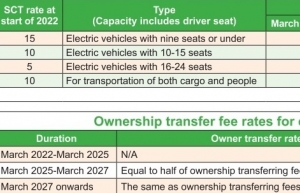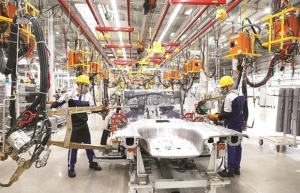Vietnam revs up for greatly improved auto industry
Under a draft strategy for the development of the automobile industry through to 2030 sent to the government late last month, the market in Vietnam will grow by 14-16 per cent annually by the end of the decade, with total consumption of over one million units. Of these, electric and hybrid vehicles are expected to account for 350,000 units.
 |
| Vietnam revs up for greatly improved auto industry, Source:freepik.com |
By 2035, domestically produced vehicles should reach 1.5 million units per year, meeting 78 per cent of market demand and exporting around 90,000 units, particularly focusing on environmentally friendly vehicles.
In the draft, the Ministry of Industry and Trade said that the Vietnamese vehicle market has made significant progress. The average car ownership per capita in Vietnam in 2023 reached 63 cars for every 1,000 people, of which passenger cars with fewer than nine seats account for 30 cars per 1,000.
In addition, Vietnam also aims to promote supporting industries. The draft strategy aims to promote supporting industries, with a target of producing 55-60 per cent of the demand for components and spare parts domestically by 2030, and 80-85 per cent by 2045. Vietnam’s mechanical engineering industry currently consists of about 30,000 enterprises, accounting for nearly 30 per cent of the country’s processing and manufacturing businesses.
“For the Vietnamese automobile industry to develop, building a strategy with a vision to 2045 is extremely urgent,” noted the draft.
The draft pointed out that the main content of the strategy is to promote the internal strength of all economic sectors in the country, focus on linking and cooperating with major vehicle manufacturing corporations to develop the industry in sync with the development of traffic infrastructure. It aims to meet domestic demand for vehicles with competitive advantages, improve competitiveness to become a supplier of components and spare parts, and create a driving force to push the country’s economic structure towards modernisation.
Nguyen Chi Sang, general secretary of the Vietnam Association of Mechanical Enterprises, told VIR that expansion and new investments in vehicle manufacturing and assembly in Vietnam were increasing the number of domestically produced and assembled vehicle models.
“This growth presents significant opportunities for the domestic supporting industry to make breakthroughs in both quantity and quality by participating more in the supply chain,” Sang said.
Every year, Vietnam imports $2-3.5 billion worth of components and spare parts for vehicle assembly and repair, primarily products with high technology content and added value. This results in a localisation rate lower than other leading regional markets such as Thailand, Indonesia, and Malaysia, where the rate averages 65-70 per cent.
In addition, the costs of assembling domestic vehicles in Vietnam are higher compared to other countries in the region, further impacting the competitiveness of the local industry.
At a prime ministerial conference with large private enterprises in late September, Tran Ba Duong, chairman of the board at THACO Group, said his ambition was to boost the localisation rate in the auto industry.
“The industry is currently undergoing a period of many technological changes, especially the interest in new energy vehicles that are green and clean, to meet the emission reduction target that Vietnam has committed to. Therefore, it is necessary to update the development strategy that was first issued in 2014,” he said.
THACO aims to become a manufacturing hub for international car manufacturers in Vietnam, while also exporting to other regions, especially the ASEAN market, to capitalise on existing trade agreements.
By the end of this year, the company plans to invest in seven more factories, followed by three additional factories in 2025, to produce components and spare parts where Vietnam has a comparative advantage. This is expected to raise the localisation rate of passenger cars to 45 per cent.
Duong said that the group continues to invest in a separate industrial park to support production in southern Vietnam, aimed at meeting the rising demand from foreign-invested enterprises shifting their production to the country. The company can currently produce 35-40 per cent of parts, components, and spare parts for such enterprises.
“We expect that next year, the contribution from the supporting industry to THACO’s overall operations will double compared to today,” Duong said.
 | How electric vehicles can shape the auto industry In order to implement Vietnam’s net-zero commitments, one of the solutions by the government is to use more electric vehicles (EVs) as a means of transportation for the step-by-step replacement of motor vehicles powered by conventional internal combustion engines. |
 | Vietnam’s auto industry needs deeper involvement in global supply: experts Vietnamese enterprises in the auto industry are not deeply involved in the global supply chain. To become global suppliers, domestic enterprises must be consistent with the management culture and business philosophy of global manufacturers, experts have said. |
What the stars mean:
★ Poor ★ ★ Promising ★★★ Good ★★★★ Very good ★★★★★ Exceptional
Related Contents
Latest News
More News
- SK Innovation-led consortium wins $2.3 billion LNG project in Nghe An (February 25, 2026 | 07:56)
- THACO opens $70 million manufacturing complex in Danang (February 25, 2026 | 07:54)
- Phu Quoc International Airport expansion approved to meet rising demand (February 24, 2026 | 10:00)
- Bac Giang International Logistics Centre faces land clearance barrier (February 24, 2026 | 08:00)
- Bright prospects abound in European investment (February 19, 2026 | 20:27)
- Internal strengths attest to commitment to progress (February 19, 2026 | 20:13)
- Vietnam, New Zealand seek level-up in ties (February 19, 2026 | 18:06)
- Untapped potential in relations with Indonesia (February 19, 2026 | 17:56)
- German strengths match Vietnamese aspirations (February 19, 2026 | 17:40)
- Kim Long Motor and AOJ Suzhou enter strategic partnership (February 16, 2026 | 13:27)

 Tag:
Tag:




















 Mobile Version
Mobile Version